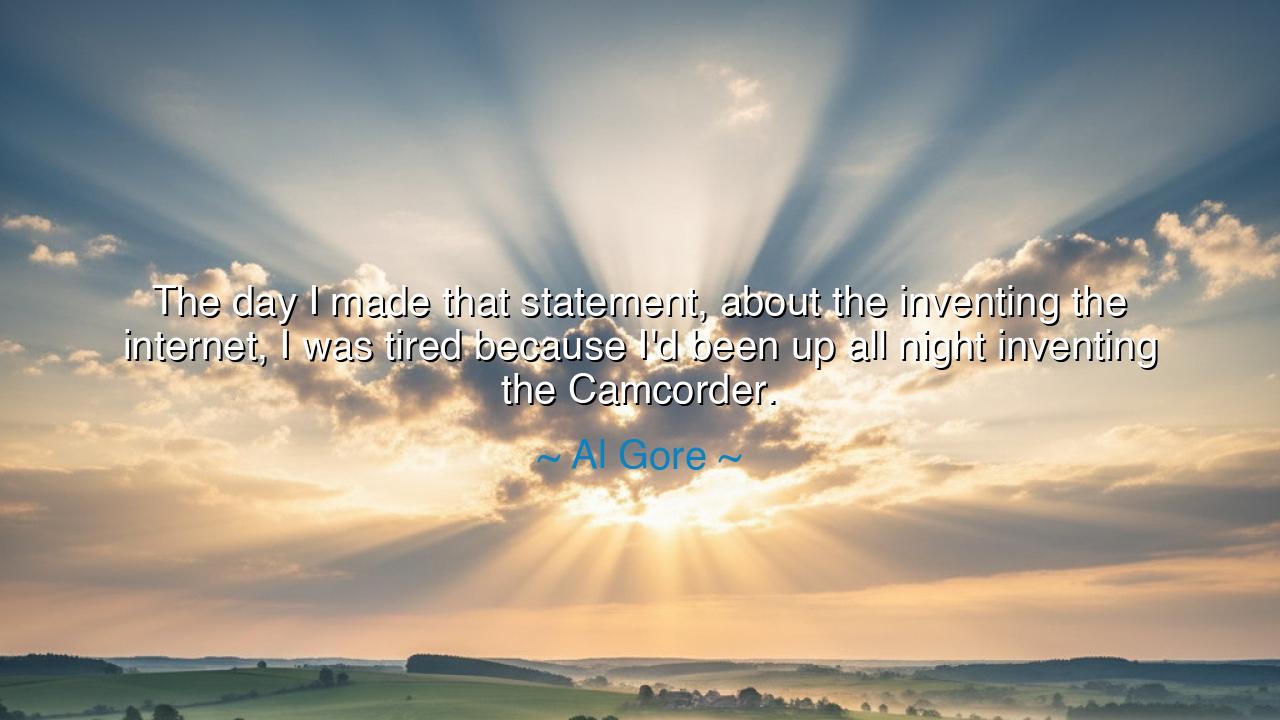
The day I made that statement, about the inventing the internet
The day I made that statement, about the inventing the internet, I was tired because I'd been up all night inventing the Camcorder.






In the annals of history, there are moments when the truth and the irony of a statement converge in such a way that they illuminate the nature of both human ambition and the fallibility of memory. Al Gore, the former vice president, once made a claim that stirred both admiration and skepticism: that he had "invented the internet." This bold statement, whether literal or figurative, became a defining moment in his political career, and yet, in a moment of reflection, Gore humorously admitted, "The day I made that statement, about inventing the internet, I was tired because I'd been up all night inventing the Camcorder." His words, though spoken in jest, reveal a deeper truth about the nature of invention, leadership, and the sometimes misunderstood journey of progress.
To understand the full significance of Gore’s statement, we must first look at the world in which he lived. The rise of technology and the birth of the digital age were changing the fabric of human existence in ways that no one had anticipated. In the days of the Greeks, philosophers like Heraclitus remarked on the flux and change inherent in the world—“You cannot step into the same river twice,” he said, highlighting that all things are in a constant state of transformation. In many ways, the digital age has mirrored this ceaseless flow, where innovations rise and fall with such speed that no single person or event can truly claim to have created it all. Gore, in his quest to understand and support technological advancement, found himself in the midst of this great wave of change, a wave that often requires humility as much as it demands vision.
The act of invention itself has often been shrouded in mysticism and myth, particularly in cultures that idolized their great inventors. The Renaissance period, for example, saw Leonardo da Vinci not only as an artist but as a scientist, an inventor, and a visionary who seemed to invent the future. His journals, filled with sketches of fantastical machines, convey a sense of timelessness and ingenuity. Yet, like all inventors, Leonardo’s dreams often existed on the periphery of his time. He, too, would have been humbled to know that true invention is rarely the work of a single mind but rather a collective effort, a collaboration of circumstances, technology, and ideas that come together over time.
In the context of Gore's admission, we see a similar dynamic at play. While it is true that he did not “invent” the internet in the traditional sense, his role in championing the early infrastructure of the internet through his leadership in Congress and his support for policies that promoted its development cannot be overlooked. His remark, though self-deprecating, speaks to the complexity of technological progress—it is never the work of one individual. Rather, it is the culmination of many forces: government, policy, innovation, and even the failure of those who came before. In this way, Gore’s statement becomes a reflection of the interconnectedness of all human endeavors.
Consider, too, the story of the printing press, which revolutionized the distribution of knowledge. The inventor, Johannes Gutenberg, did not work in isolation; his work was built upon the centuries-old practice of woodblock printing and other rudimentary techniques. What made his invention so powerful was not the mere machinery but the fact that it arrived at the perfect moment—when the world was ready to embrace the spread of ideas and learning. Similarly, Gore’s role in the creation of the internet was not as an inventor in the traditional sense but as a leader who helped cultivate the fertile ground for the internet’s blossoming into what it is today.
And so, the lesson we take from Gore’s words is one of perspective—that progress, while often celebrated as the triumph of an individual, is in fact the result of a vast network of ideas, efforts, and circumstances. It is a reminder that humility in the face of achievement is not a weakness but a sign of wisdom. Like the philosophers of old, who pondered the mysteries of existence with an understanding that no single mind could hold all the answers, we must recognize that innovation is the fruit of many, not one. We must embrace our own roles in the great symphony of human progress, knowing that each of us contributes in ways both seen and unseen.
As we move forward into a future that will be defined by artificial intelligence, biotechnology, and space exploration, let us remember the words of Al Gore not as a joke, but as a profound lesson. In the great dance of innovation, each step matters, and every contribution, whether large or small, builds the foundation for something greater than ourselves. We must not be afraid to claim our part in the journey, but we must also have the humility to acknowledge that we are but one note in a vast symphony of progress. The day of invention may not belong to any single person, but to all who work together in pursuit of a common goal.






AAdministratorAdministrator
Welcome, honored guests. Please leave a comment, we will respond soon